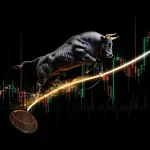What Does Capitulation Mean? No Backbone, No Gains
Feb 8, 2025
Only the unyielding survive in the crucible of market turbulence. Capitulation is not simply a moment of panic—it is the demise of conviction and the triumph of fear over opportunity. In today’s volatile markets, a moment of capitulation can spell disaster for those lacking the backbone to withstand temporary adversity. This essay delves into the essence of capitulation, exploring why those who fold under pressure never realize lasting gains and how steadfast conviction and strategic discipline separate the true market warriors from the spineless.
The Anatomy of Capitulation
Capitulation occurs when investors surrender their positions in a state of blind panic, selling off their holdings desperately to escape further losses. In effect, it is the moment when fear overrides careful analysis, and conviction gives way to irrational behaviour. Capitulation often signals a market bottom; however, those who capitulate trade away potential profits and their credibility as disciplined market participants. Investors lacking backbone and unwilling to weather the temporary storm are rejected by the forces that build enduring wealth.
Capitulation is rooted in two critical psychological phenomena: fear and herd behavior. When a market faces a downturn, the collective anxiety intensifies, causing investors to abandon their strategies. Their actions are driven by a reactive impulse rather than a proactive plan, leading to significant undervaluation of assets that, if held, could later yield substantial returns. Resistance in the face of adversity is a hallmark of the resilient investor. Without a backbone, there are no foundations from which gains can be built, and capitulation becomes a personal loss and a contagion that undermines overall market confidence.
Market Psychology and the Cost of Fear
Understanding capitulation requires a deep dive into market psychology. The emotions of greed, fear, and FOMO (Fear of Missing Out) drive investor behaviour far more than cold, hard statistics. During periods of market euphoria, investors chase the thrill of rising prices. However, the moment red ink appears on the screen, that euphoria transforms into paralyzing fear. Investors, once brimming with conviction, suddenly find themselves overwhelmed by the prospect of mounting losses. This psychological reversal is at the heart of capitulation.
History has repeatedly shown that those who capitulate in the face of temporary setbacks miss the opportunity to buy at discounted prices and benefit from the eventual market rebound. The cycle is clear and unforgiving: greed blinds, FOMO influences decision-making, and the sheer force of panic leaves little room for rational evaluation. In essence, it is not the market that punishes capitulation—the investor does so by abandoning their long-term strategy at the mere hint of adversity.
The Consequences of Losing Your Backbone
In the arena of investing, a backbone is synonymous with resilience. The ability to maintain one’s composure amid market chaos is what separates the winners from the losers. When investors allow fear to dictate their actions, they forfeit the strength required to endure market cycles. Without the courage to hold fast during downturns, successive opportunities for wealth creation vanish before their eyes.
Investors who do not build intentional, strategic positions are doomed to react rather than to lead. The disciplined ones plan their entries and exits, understanding that market cycles are both constant and cyclical, with downturns followed by rebounds. Capitulation is not an isolated event; it is symptomatic of a broader failure—a failure to combine vision with discipline, to embrace volatility as an opportunity rather than a threat. Those who capitulate lack the spine to be patient when the market brushes aside temporary turmoil, and in doing so, they forfeit gains reserved for the steadfast.
The Spineless Market: Capitulation Over Conviction
Once, investors were warriors—bold, calculating, and relentless in their pursuit of opportunity. Now? A shadow of their former selves. Weak. Fickle. Addicted to the euphoria of green candles yet paralyzed by the first whiff of red. They don’t strategize; they react. They don’t build; they chase. FOMO has replaced foresight, and fear has become their master.
They crumble at the first sign of a sell-off, dumping positions in a blind panic. When the market surges, they scramble to buy at the top, desperate to belong. There is no discipline or resilience—just a herd of followers mistaking movement for strategy. They worship momentum but have no spine to withstand the inevitable pullback.
They should be raging against the tide, seizing weakness as an opportunity, moving with precision while the masses flail. Instead, they fold, letting the market dictate their fate. The real players—those with vision—aren’t swayed by noise. They see the cycles for what they are: opportunities forged in fear and wealth built on the hesitation of the weak.
But today’s market? It rewards those who refuse to bow to the madness and punishes those who think sentiment is a strategy. So, what will it be? Blind panic or ruthless execution? Capitulation or control? Weak hands or unshakable resolve?
Because in this game, the choice is simple: conquer or be conquered.
The Reality of Capitulation: No Backbone, No Gains
When the market plunges, it is not always the situation that defines our destiny—it is our response to it. Capitulation is the surrender of our very backbone. Investors who lack the resilience to withstand turbulent times are inevitably left behind, their portfolios diminished by the rapid and reckless exit from positions. On the other hand, those who stay the course, leveraging market downturns as opportunities to buy quality assets at discounted rates, ultimately reap the rewards when market sentiment turns around.
In this context, capitulation is more than just a market reaction. It is a personal failure—a sign of a mind unwilling to trust in its analysis and a strategy born more of fear than of calculated judgment. True market acumen comes from understanding that every downturn carries the seed of future prosperity and that one can build a foundation for lasting financial gains by holding on.
Market Timing: The Art of Getting In Early and Out Even Earlier
Are you trying to nail the exact top? A fool’s errand. Over the years, we’ve come remarkably close to calling market peaks, but let’s be clear—pure luck played a role. Anyone claiming they can do it consistently is selling illusions. Just look at the track record of so-called experts.
The real lesson? Learn from history’s folly. The smart money gets in early and, more importantly, out early. The masses, as always, pile in too late and cling on even later. We exited the housing market more than a year before the crash, beginning our move in late 2006—only to be mocked as fools. Before that, when advising private clients, we warned them to exit the dot-com frenzy by mid-1999. Sure, the market surged higher afterwards—but what good is a late-stage rally when all the gains are wiped out?
And let’s not forget COVID—the moment when over 90% lashed out against us with pure venom. It was the most vicious backlash we had ever faced. The outrage was deafening, the insults relentless, the foul language rampant—all because we dared to say that the 2020 crash was the buying opportunity of a lifetime and that a MOAB (Mother of All Buys) had been triggered. But fickle minds forget. They always do. Just like fruit flies, their memory is short, their conviction even shorter.
The only constants? Patience. Discipline. And never assume that this time is different—especially regarding human folly.
The cycle never changes. Greed blinds, FOMO takes hold, and those who ignore history pay the price.
Historical Insights: Lessons from Market Collapses
Capitulation is not a modern invention. It has been the defining moment in numerous historical market collapses, from the Great Crash of 1929 to the dot-com bubble burst and the financial crises of recent decades. The same story unfolds each time: the fearless become fearful, and the disciplined abandon their positions, only to watch as the market eventually bounces back and rewards those who held on.
Consider the housing market crash of the mid-2000s. Investors who maintained their conviction during the initial downturn were rewarded enormous gains as the market eventually rebounded. In contrast, those who capitulated during the early stages of the collapse were locked out of the subsequent rise. History illustrates that capitulation is a self-fulfilling prophecy—a surrender to fear that incurs immediate losses and undermines future profit potential.
Moreover, the experience of the COVID crash in 2020 underscored this truth. While many investors sold off in a panic, the resilient ones who recognized the inherent value in the market faced unprecedented buying opportunities. The aftermath of the crash vividly demonstrated that capitulation is the enemy of innovation and progress in investment portfolios.
The Virtue of Conviction and Strategic Discipline
The antidote to capitulation is steadfast conviction and disciplined strategy. Successful investors do not shy away from uncertainty; instead, they embrace it as an inherent part of the market cycle. They understand that volatility is not synonymous with failure but is the catalyst for opportunity. This is where strategic discipline comes into play. Rather than reacting impulsively, these investors plan, enter the market with clearly defined risk parameters, and, most importantly, maintain calm during extreme emotional turmoil.
Investment strategies that blend technical analysis with sound market fundamentals create a robust framework to counteract the impulse to capitulate. These strategies use historical data, trend analysis, and risk management tools to help investors stay the course, even when the market appears to be spiralling out of control. Moreover, such strategies serve as a reminder that no matter how raucous the market’s mood may become, success is ultimately driven by long-term vision and persistence—not by momentary reactions.
Embracing a Visionary Path: Conquer or Be Conquered
The market is a battleground where every investor must choose between surrender and strategic defiance. The visionary investor sees beyond the immediate noise, recognizing that periods of panic and capitulation are temporary disturbances on the path to long-term wealth creation. The market rewards those who adopt a contrarian approach in the face of widespread panic—those who see value where others see only chaos.
Conquering the psychological chains of capitulation requires more than acquiring market knowledge; it demands inner strength, a relentless adherence to one’s principles, and an unwavering commitment to disciplined execution. Amid the clamour of market speculation, the investor with a true backbone stands out. This individual embraces the cyclical nature of the markets, well aware that history is a series of repeating lessons and that true gains are reserved for those who act wisely when others succumb to fear.
As imperfect as it may be, market timing is an art refined over the course of experience. While attempting to predict every market peak is folly, understanding the broader cycles and recognizing the critical moments of capitulation create opportunities for substantial rewards. The pathway to sustainable success is the virtuous cycle of entering early, resting in conviction during downturns, and then exiting with calculated precision.
A Call to Action: Rebuild Your Backbone
What does capitulation mean? It is a question with profound implications for every investor willing to face the challenge of uncertainty. Capitulation signifies the moment when an investor abandons a strategy and their inner strength. It is the antithesis of the disciplined, visionary approach required to thrive in a dynamic and unpredictable marketplace.
The answer to this challenge is simple yet powerful: cultivate a resilient spine, build your strategy on a foundation of rigorous analysis, and never let market fear compromise your long-term vision. Stand apart from the crowd of followers who mistake momentum for strategy. Instead, embrace an approach that values patience, discipline, and the informed execution of market timing principles. The cycle is unchangeable: greed blinds, FOMO takes hold, and those who ignore the lessons of the past ultimately pay the price.
The market of today rewards those who refuse to surrender to sentiment. It favours the resolute investor who carefully navigates the waves of volatility and emerges stronger after each storm. With an unwavering commitment to a methodical strategy, one can harness the inherent opportunities presented during market capitulations and transform them into goldmines of opportunity. It is in rejecting the bland conformity of blind panic that one forges the resolute spirit necessary to conquer and build lasting wealth.
Conclusion: No Backbone, No Gains
The true meaning of capitulation transcends a mere market exit—it is the loss of one’s resolve, an abandonment of conviction, and ultimately, a surrender to the basest instincts of fear. As we have seen through historical lessons and personal experience, capitulating in the face of market adversity is a recipe for unfulfilled potential and lost gains. Investors who fail to build a solid backbone, who yield to the seductive allure of momentary sentiment, are left to watch as decisive, strategic players craft their fortunes out of the chaos.
To achieve sustainable success, every investor must recognize that the market is as much about personal fortitude as it is about financial strategy. The lessons are clear: develop a steadfast philosophy grounded in disciplined execution; understand that every market downturn is also a precursory moment to enormous opportunity; and above all, never let capitulation rob you of the courage to stand firm when your conviction is tested.
The rewards are immense for those who commit to forging ahead with resolute determination. You must reject the temptation to capitulate at the first sign of trouble and instead harness the lessons of every downturn to build an unassailable foundation. In the relentless pursuit of market success, there is only one choice—conquer or be conquered.













